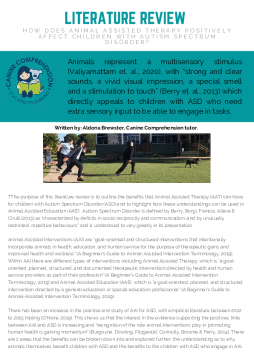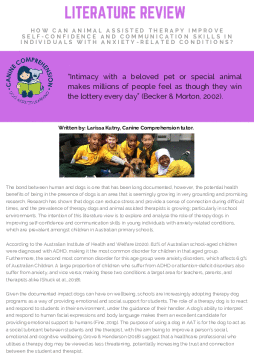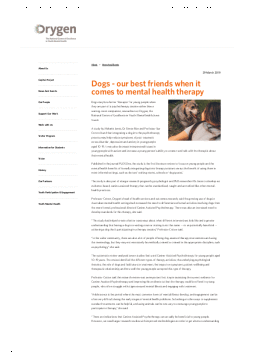
Forms
Parent Support
Compliance
- WorkCover Insurance Certificate of Currency
- Combined Insurance Certificate
- Safe Work Methods Statements (SWMS)
- Risk in classrooms assessment
- Venue Animal Management Plan
Supervision from the school is necessary.
Legal supervision is a top priority. A school representative must be present for each session without exception. We have found that continuity with familiar staff enhances the program's effectiveness for adults and students. We collaborate closely with schools to maintain a secure and enriching environment, adhering to stringent safety and well-being standards. The care and security of your students are our highest priorities.
Working With Children's Checks
All staff hold a WWCC and can provide evidence when required.
Canine Comprehension ensures that its staff entering School premises:
(i) have undertaken a satisfactory working with children check; and
(ii) have met any additional relevant legal requirements and policies of the School Council and/or School about the suitability of mentors to work with school children or within the precinct of the School.
Canine Comprehension acknowledges and agrees that Schools are committed to creating child-safe environments and protecting students from abuse or harm in the school environment, managing the risk of child abuse, providing support to a child at risk of child abuse and responding to incidents or allegations of child abuse in accordance with their legal obligations, including Child Safety Laws.
Canine Comprehension acknowledges that the School Council and School Staff must comply with Child Safety Laws, the Ministerial Order and School Council Child Safety Policies.
Safety Statements
- Commitment to Child Safety Statement
- Inappropriate Behaviour Prevention Statement
- Inclusion Statement
- Behaviour Management Statement
- Dog Safety Statement
- LGBTIQ Support Statement
- OHS Consult Comms Procedure
- School Policy and Advisory Guide
- Health, Safety and Wellbeing Policy
- Child Safe Policy
- Child Safe Responding & Reporting Policy
Canine Comprehension recognises that their service delivery is bound by the following policies deemed relevant by the Principal / Director of the school to the delivery of the Services, on the basis that the Principal / Director provides these documents in written form at least 2 weeks before services commence (where necessary) an orientation and explanation is provided to the Supplier of what is expected to conform to these policies:
(i) Student Support Group Guidelines;
(ii) Primary Welfare Officer Initiative Guidelines;
(iii) Schoolcare Program Guidelines;
(iv) Medical Intervention Support Guidelines;
(v) The Victorian Prevention and Health Promotion Achievement Program (Primary schools);
(vi) Promoting Healthy Minds for Learning and Living (Victorian Mental Health Reform Strategy);
(vii) Protecting the safety and well-being of children and young people (protocol);
(viii) A step-by-step guide to making a report to Child Protection or Child FIRST;
(ix) Guidelines for the management of student services files;
(x) any of the School Council’s rules, regulations, protocols, procedures, by-laws and any other relevant information of which the Canine Comprehension has been notified.
Associations & Compliance







Program Evaluation Statement
Literature Reviews

ASD Literature Review
How does Animal Assisted Therapy Positively Affect Children with Autism Spectrum Disorder

Human & dog connection Literature Review
How can animal assisted therapy improve self-confidence and communication skills in individuals with anxiety-related conditions?

AAT as an intervention during COVID-19 lockdowns Literature Review
Would AAT be effective as an intervention to engage students with school after the decline in well-being from COVID-19 lockdowns?

Is animal assisted therapy effective for pain management Literature Review
Animal assisted therapy, facilitated by a trained therapist, is a health care modality that harnesses the power of the symbiotic relationship between animals and humans to achieve specific, measurable health outcomes.

How does animal assisted therapy support student wellbeing in educational settings Literature Review
It is estimated that dogs have assisted in regulating emotions and behaviour for humans for possibly 32,000 years.

How can therapy dogs support students’ emerging literacy skills Literature Review
Early attainment of literacy skills makes students more likely to continue on a positive trajectory throughout their schooling and beyond.
Articles
Randomised control traials: Evidence from published systematic reviews and randomised controlled trials (RCT).
The purpose of this study was to investigate the effects of animal-assisted therapy on the anxiety and school attendance of students with disabilities in a middle school language and learning disabled classroom.
Mindfulness practices with and without a dog.
The aim of this study was to qualitatively explore children’s experiences of learning mindfulness in school, with and without a dog.
Friesen, L. Exploring Animal-Assisted Programs with Children in School and Therapeutic Contexts. Early Childhood Educ J 37, 261–267 (2010). https://doi.org/10.1007/s10643-009-0349-5
Animal-assisted programs, particularly those involving therapy dogs, are increasingly popular in educational and therapeutic settings, offering children physiological, emotional, social, and physical support. This article highlights the benefits and concerns associated with such programs, emphasizing the unique role of therapy dogs as non-judgmental companions providing valuable social and emotional support to children in these environments.
students with disabilities Theses and Dissertations. 2669.
This study aimed to examine the impact of animal-assisted therapy on anxiety and school attendance among students with disabilities in a middle school language and learning disabled classroom, using a single-subject design with ABAB phases. Participants engaged in animal-assisted therapy during science class, with anxiety levels assessed using Ottawa-Georgia stress scales and attendance tracked via daily rosters. Findings indicate a reduction in anxiety levels and improved attendance with high satisfaction reported among students for the use of animal-assisted therapy.
reading and social/emotional skills of selected primary school students.
This study explored the effectiveness of the Delta Society Classroom Canines™ program in enhancing reading and social/emotional skills among selected students in a Queensland primary school. Utilising both quantitative and qualitative data, including reading scores, attendance records, observations, and interviews, findings suggest positive impacts on student motivation, reading proficiency, confidence, and self-esteem.
Articles that mention research
Dogs - our best friends when it comes to mental health therapy
Dogs may be a better ‘therapist’ for young people when they are part of a psychotherapy session rather than a waiting-room companion

The effectiveness of animal-assisted therapy on the anxiety and school attendance of students with disabilities
The purpose of this study was to investigate the effects of animal-assisted therapy on the anxiety and school attendance of students with disabilities in a middle school language and learning disabled classroom.

Dogs - our best friends when it comes to mental health therapy
Dogs may be a better ‘therapist’ for young people when they are part of a psychotherapy session rather than a waiting-room companion

Mindfulness practices with and without a dog.
The aim of this study was to qualitatively explore children’s experiences of learning mindfulness in school, with and without a dog.

IAHAIO research the Meaning and Motivation of Children Participating in AAI
The purpose of this research is to explore the meaningfulness and motivation animal-assisted therapy interventions provide for pediatric clients when compared with traditional occupational therapy treatment.

IAHAIO research AAI for Children with Autism Spectrum Disorders
Our survey of animal-assisted interventions (AAI) offered by French intervention facilities aimed to examine and describe the range of AAI for autism spectrum disorder (ASD) children.









